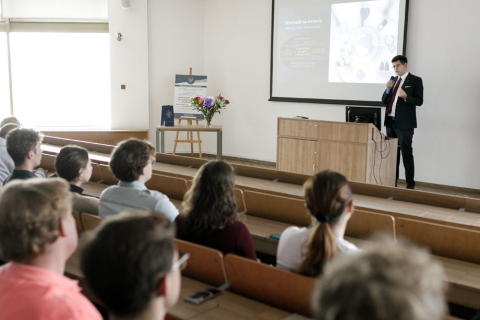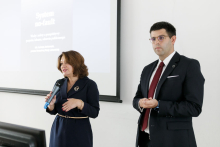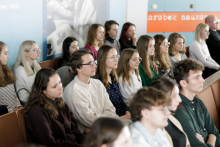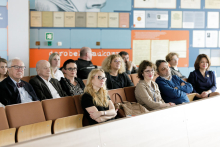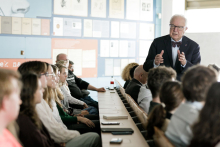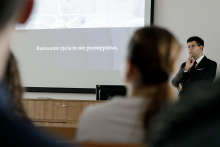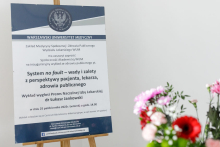The introduction of the „No-Fault” system in Poland has been a pressing issue recently. In simple terms, it consists in reporting adverse effects without apporting the liability of a medical professional, with concurrent compensation for the patient for the health detriment. What are the benefits of a factual „No-Fault” system with respect to the public health in our country? The speaker believes that the answer is simple: a satisfied doctor and a satisfied patient. The system is based on an analysis of adverse events and their causes and on drawing conclusions for the future. – Try to imagine that we blame a pilot for every aviation catastrophe (...) If such system was introduced, we would not fly planes anymore, as the pilots would be simply afraid of flying. But that is not the case in aviation, as in the event of accidents, the investigation covers the entire chain of events (...) The analysis of the entire chain of events allows the system to learn from the existing mistakes, and to eliminate these faults at the same time – explained the president of the Supreme Medical Council. Of course, the „No-Fault” system does not release doctors from responsibility. There is still the civil and disciplinary liability, but the medical professionals are not persecuted by the prosecutor. It is also beneficial for the patient, who does no only receive compensation, but also begins to trust the doctor, as he or she does not have to hide anything out of fear.
What is the current situation in Poland? President Jankowski believes that we are still not fighting mistakes, but rather people, who make mistakes by nature. The system seeks for the guilty ones, it seeks justice, it instils fear and penalizes. And this begins to have a factual impact on health protection: - 2/3 specialisation positions in surgery were not staffed under the last procedure; doctors are simply afraid of becoming surgeons due to the legal liability which may accompany this profession – emphasized the speaker. More importantly, the „Guilty-First” system block the development of science and medicine. How should we then create a factual system of treatment safety in our country? The president believes – primarily by establishing a fund of compensatory medical events. Secondly, by introducing a register of adverse events to which the doctors could and want to report, without fear of what is coming next. Thirdly, by changing the principles of responsibility of the medical professionals, which is not to be mistaken with impunity. „No-Fault” systems are present, for instance, in Sweden, Denmark or New Zealand. The patient who suffers a health detriment is informed by the doctor of the possible compensation. He or she is later qualified and referred for rehabilitation and receives payment from the fund. The doctor, in turn, returns to work. - This system begins with legal and social atmosphere: the patient trusts the doctor; the money in the compensation fund; admitting that doctors make mistakes; putting the patient first – emphasized the president.
- Today, the chance that a doctor ends up in prison is slim. The atmosphere created around that, the pressure, the „ruthless” which hinders our work – it is now the real issue and we must talk about that (...) – Łukasz Jankowski summarised his presentation.
A discussion started after the lecture. The participants discussed, among others, the proper quality of issuing opinions on the mistakes made by doctors, showing empathy and the dehumanisation of doctors by the system, the reverse claims and the proper management of documentation.
Łukasz Jankowski is a specialist in nephrology, a graduate of the Medical University of Warsaw, professionally employed at the Department of Nephrology, Transplantology and Internal Diseases of the MUW. He has been the president of the Supreme Medical Council since May 2022. He attended the classes with the students at the invitation of Professor Aneta Nitsch-Osuch, the Head of the Department of Social Medicine and Public Health of the MUW and the initiator of open lectures in public health. The first was held in 2016. – I am glad that each year the lectures are perceived as increasingly more interesting – said Professor Nitsch-Osuch.
Apart from the students, Łukasz Jankowski’s lecture was attended also by Professor eng. Professor Agnieszka Cudnoch-Jedrzejewska, MD, PhD Vice Rector for Human Resources, Professor Jerzy Jurkiewicz, Professor Andrzej Członkowski, Professor Dagmara Mirowska-Guzel, Andrea Horvath, PhD, Piotr Dziechciarz, PhD, Joanna Peradzyńska, PhD.
On the „No-Fault” system. The President of the Supreme Medical Council at the lectures in public health
– Saving lives is not a crime. I would like you to leave this lecture with the belief that a good „No-Fault” system allows for development – to make sure that a patient is in the centre, to develop the organisation (...) – said Łukasz Jankowski, the President of the Supreme Medical Council during the lecture inaugurating the series of lectures in public health in the 2022/2023 academic year for the students of medicine. The event was organised by the Department of Social Medicine and Public Health of the MUW.
